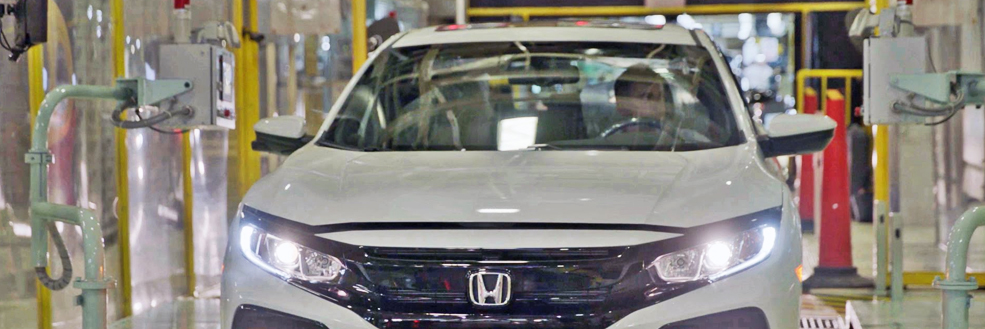This article was written by Gavin White, a member of The Recruitment Network and was featured in The Global Recruiter magazine. We also want to congratulate to Gavin White and the team at Autotech for their win as best Specialist Recruitment Company at the Global Recruiter UK Industry Awards 2017!
The shortfall of skills in the automotive industry is not new but with the UK automotive scene poised for continued growth, coupled with the fact vehicles are becoming increasingly computerised, the situation has become more pressing. No longer is the career path a matter of looking over the shoulder of a patient mentor. Progressing in the motor industry demands digital skills — a diagnostician who can solve puzzles without physical clues, like an engine knocking or an oil leak.
The automotive production boom follows a turbulent few years, particularly through the recession, which saw many manufacturers reach out to China. The lure, however, of attractive taxation, regulation and increased labour flexibility has seen the re-shoring of automotive manufacturing back to the British Isles.
Subsequently, the revival of the UK automotive industry has brought significant success to the sector and around 800,000 jobs across Britain were sustained. In March this year alone, the number of cars made in Britain reached 170,691 – the best manufacturing month reported in 17 years and forecasters are predicting an all-time record of two million by 2020. And it isn’t just manufacturing, the automotive aftermarket is a vital component within the UK economy, providing motorists with choices over how they service and repair their vehicles.

A report commissioned by the Society of Motor Manufacturers and Traders (SMMT) last year, revealed that as the number of cars on the road increases, this sector’s value is set to rise to £28 billion by 2022. The number of jobs in the aftermarket area alone is also expected to rise by almost 17 per cent to 400,000 roles.
Skills required
This success, however, could be undermined by the lack of skilled workers to fill new positions. As the industry continues to thrive, employment will continue to rise along with the forecasted vehicle output. According to a 2016 report by the Automotive Council, there were 5,000 jobs vacant in UK automotive due to skills shortage. Therefore it is essential, to retain our position within the global field, that an influx of new talent is recruited and nurtured to meet demand and the changing face of technology.
During the recession, the sector lost many of their skilled workforce to other industries. Consequently, automotive companies have found it difficult to recruit employees with the ability to work across multiple areas, as vehicles become increasingly technical. In fact, the growing demand for these skilled candidates, combined with the shortage of those highly qualified, experienced industry professionals, has created a challenging recruitment market for employers. Even small, independent garages are realising the benefit of using technical recruitment specialists in a market where indemand talent is difficult to attract. From a job seeker’s perspective, there is a greater sense of determination when entering the market as they realise the progression opportunity this booming industry can bring and, in the case of permanent recruitment, we see that today’s skilled technicians are very much aware of their value and continue to actively seek new job opportunities.
To this end, automotive businesses need effective HR management to build and maintain strong teams. Employees in the industry tend to be more focused on completing the task at hand, repairing the malfunctioning vehicle, or meeting an individual sales quota to focus on the development of their workforce. More needs to be done, particularly with smaller garages, to recruit and retain employees.
Some of the larger automotive companies are doing more to keep their staff, often presenting counter offers to a skilled employee who is looking to move on, however the smaller garages seem unaware of the importance of employee retention and the fact that they need to specifically train employees to fit into their business who they can trust to work to the highest standards.
With automotive technology moving at such a high pace, the industry needs to recruit and continue to train employees to ensure they not only retain their workforce, but that they possess the right blend of skills and education to complete technical jobs effectively and keep up with not just technology, but the growing complexity of vehicles.
According to statistics sourced by the SMMT, the average content of a British built car sourced domestically is now 41 per cent, compared to 36 per cent in 2011. Couple this with the fact that over 30 million vehicles are serviced each year, anyone entering the industry needs to be continually trained to ensure their knowledge is current.
Where’s the motivation?
While we don’t have any hard data, it’s very apparent from the number of people calling us seeking employment that de-motivation is a major factor for finding a new job within the motor trade.
Money is actually lower down on the list, what employees are actually looking for is the option to progress and better themselves through training and the potential to move up the ladder. However, so many companies are not delivering on their training promises and this is affecting the morale and motivation of their workforce.
Last year the Driver & Vehicle Standards Agency(DVSA) announced plans to change the way MOT training is carried out. The original, MOT tester refresher course was replaced with a tougher qualification, which every UK MOT Tester must complete, or risk their licence being suspended. Incorporating three hours of MOT training and an annual exam, each year the syllabus is refreshed to ensure testers are fully compliant with regulations and testing requirements.
This is testament to the growing emphasis on maintaining a high skill set within the industry and for fulfilling training promises. CIPD reports suggest that UK employers spend less on training than other major EU economies and we are fourth from the bottom on the EU league table on participation in job-related adult learning. We need a serious U-turn on this within the automotive industry if we are to become a centre of excellence for car manufacturing. Retention is key, but so is filling the vacancies which will inevitably rise from the exodus of retiring workers.
Typically perceived as an old-fashioned and dirty trade, the automotive industry has become increasingly high tech, with electronics and computers fitted into cars. Increasingly career pathways, such as apprenticeship programmes, are being introduced as a route to harness fresh new talent, ensuring that the industry has the practical skills and qualifications needed now, and in the future.
The industry needs to be made an attractive option at a young age to ensure that the next generation of talent is enthusiastic and willing to learn the necessary skills. Today, there are more millennials wanting to get into the automotive industry – which will go a long way to lowering the skills gap. However, many longer established garage owners and managers, who are more in tune with the oily end of the business, are fearful of this up-and-coming generation. Millennials have different communication habits and are way more connected, and in tune with technology and online culture, but the reality is, as the industry becomes more and more technical, it is the millennials who will drive this forward, and the older generation need to embrace this skillset.

Next generation
It is essential that we continue to attract millennials, and demonstrate the advancements which have been made within the industry. But it is equally important that this learning begins in the very foundations of education.
Global Recruiter recently reported on analysis from the CIPD, the professional body for HR and people development, which revealed that two decades of under investment on the development of skills in the UK has contributed to our country being behind the rest of Europe in the most basic of skills. Not a great start to our post-Brexit future.
Building in a culture of life-long learning and training into the automotive workers of today is the way forward. As a niche recruitment agency we are keeping our finger on the pulse in terms of current issues and new opportunities arising within the industry and our dedicated training and apprenticeship divisions will help bring new lifeblood into the industry. In the recent budget Philip Hammond pledged an investment of £270 million for electric cars, so there is little doubt we are on a sharp trajectory in the motor trade and as Brexit leaves us with tighter restrictions on bringing in talent from outside of the UK we must focus on developing the education of our current and future workforce to demonstrate the prolific industry we work in.
Share :




